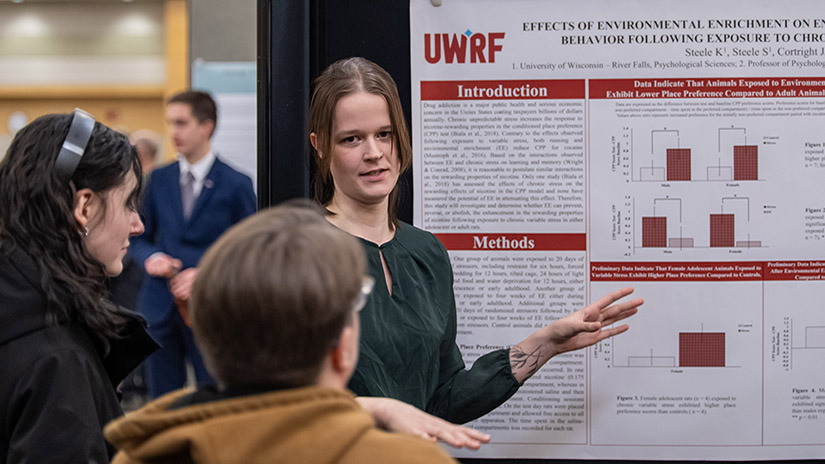UNIVERSITY OF WISCONSIN River Falls
Newsroom

Sarah Steele, a junior at UW-River Falls, describes a research project she is part of to onlookers during Tuesday’s Undergraduate Research, Scholarly and Creative Activity Fall Gala at the university. A total of 112 students presented 68 projects at the event. UWRF photo
‘You can’t help but be impressed’: UW-River Falls students showcase their academic skills at URSCA Fall Gala
Dec. 4, 2024 - Katrina Steele knows her stuff. Fellow UW-River Falls student and research partner Sarah Steele (not related) does, too.
The pair presented their research project Tuesday at the Undergraduate Research, Scholarly and Creative Activity (URSCA) Fall Gala Tuesday at UWRF. They described how their experiments on trauma and substance abuse in rats relates to humans, and how their research could help lead to better outcomes for people.
“This research is important because it can help people,” Sarah Steele said. “That’s a big reason why we are motivated to do this work, because we hope it can have a real, positive impact.”
Katrina Steele, a senior from Bismarck, N.D., triple majoring in neuroscience, psychology, and biomedical health science, and Sarah Steele, a junior from Hudson double majoring in neuroscience and biomedical health science, said the depth of their research ensures that they know their project thoroughly and can discuss it thoughtfully with others.
They have presented their work at other research events, including in Long Beach, Calif., and Washington, D.C. Their research, combined with presentation experience, has significantly improved their confidence, they said. The duo was among 112 students presenting 68 projects as part of Fall Gala.
“The first time I presented, I was afraid to even talk,” Katrina said with a laugh. “Now I feel really confident talking about our work. I know having that confidence is going to serve me well going forward.”
That sentiment is music to the ears of Molly Gerrish, a teacher education professor and URSCA director. UWRF established the URSCA Office in 2013 to support and promote undergraduate research and creative, high-impact student learning opportunities.
Increased self-confidence is one of the benefits students glean from participating in the many high-quality research opportunities UWRF offers, Gerrish said.
“As these students do their research and grow their skills and knowledge, they begin to see themselves as real scholars,” she said. “One of the most heartening aspects of this is seeing students’ confidence grow.”
The student work on display at the gala is evidence of the quality research opportunities available to UWRF students, Gerrish said. She praised the challenging, high-impact projects students take part in and their ability to work closely with professors who serve as mentors.
“Students here have the opportunity to work on high-level projects with faculty,” Gerrish said. “It is the kind of very involved, in-depth, hands-on learning that often isn’t available to undergraduate students elsewhere.”
Students presenting their research at the Fall Gala said such learning opportunities are among the reasons they chose to attend UWRF. They said conducting quality research as an undergraduate sets them up for success whether they plan to attend graduate school or enter the workforce.
Sophia Symalla is part of a research project that studies the impact of social isolation on mice and how that correlates to human teens’ addiction issues. She said that work has taught her the academic and critical thinking skills to further her career aspirations.
A junior neuroscience and psychology double major from Woodbury, Minn., she hopes to get her doctorate in neuroscience and conduct autism research. Like many UWRF students, Symalla has been part of other research efforts as well during her time at the university.
“I’m so thankful for the opportunity to do so many great research projects with professors here,” she said. “Those experiences have not only greatly improved my knowledge but have set me up for doing the kind of work in the future that I want to do.”
Symalla and other students said their interactions with faculty research mentors is invaluable. The personal, caring approach of UWRF faculty not only increases learning, students said, but makes the research more enjoyable.
“He is not only helpful, but he empowers us to take the lead on our research,” Sarah Steele said of her faculty mentor, James Cortright, an associate professor of psychological sciences. “And when we need to be reined in and go in a different direction, he knows how to help us do that, too.”
Grace Lewis, an assistant professor of animal and food science, said students involved with research are motivated to work and often only need opportunities and guidance to find success. She worked with three students who presented their research at the Fall Gala.
“These students just need the chance to show what they can do,” Lewis said. “You look at the work they are doing, and you can’t help but be impressed.”










